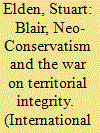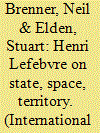|
|
|
Sort Order |
|
|
|
Items / Page
|
|
|
|
|
|
|
| Srl | Item |
| 1 |
ID:
079470


|
|
|
|
|
| Publication |
2007.
|
| Summary/Abstract |
This essay uses the war on Iraq and in particular the legal advice of the British Attorney General to explore two tensions.1 The first is between Blair's foreign policy with its 'ethical dimension' and call for humanitarian intervention by the international community and the project of the neo-conservatives in the US. The second is in the notion of territorial integrity, which means both the idea of territorial preservation and that within this territory a state is sovereign. The war on Iraq, which violated territorial sovereignty, was fought against a backdrop of preserving the existing territorial settlement, especially regarding the Kurds. While Blair and the neo-conservatives share an argument against territorial sovereignty as an unconditioned absolute, and hold a belief in the need for territorial stability, their positions differ on the mechanisms needed. Blair strove for an internationalist position; the neo-conservatives argue for US exceptionalism. Ultimately though, faced with a decision, Blair joined the US in violating a sovereign state's territorial integrity without international support
|
|
|
|
|
|
|
|
|
|
|
|
|
|
|
|
| 2 |
ID:
092294


|
|
|
|
|
| Publication |
2009.
|
| Summary/Abstract |
In this article, we offer an account of how the French Marxist philosopher and sociologist Henri Lefebvre can be read as a theorist of territory. While Lefebvre's writings on state space have generated some interest in recent years, the territorial dimensions of his thinking on this issue have not been explored. Meanwhile, the question of territory has been oddly undertheorized in the post-1970s literatures on international relations and spatialized political economy. Against this background, we suggest that Lefebvre's work contains some insightful, if unsystematic, observations on the relationship between states, space and territory. Following consideration of Agnew's (1994) influential injunction that social scientists transcend the "territorial trap," we develop this reading of Lefebvre with reference to three key dimensions of his approach to state space as territory-first, the production of territory; second, state territorial strategies; and third, the "territory effect," namely, the state's tendency, through its territorial form, to naturalize its own transformative effects on sociospatial relations. Thus construed, Lefebvre's approach productively raises the issue of how the territorial trap is actually constructed and reproduced.
|
|
|
|
|
|
|
|
|
|
|
|
|
|
|
|
| 3 |
ID:
074798


|
|
|
|
|
| Publication |
2006.
|
| Summary/Abstract |
Immanuel Kant is today often invoked as an emblematic figure for Europe. In works by thinkers such as Zygmunt Bauman, Jacques Derrida, Michel Foucault and Jürgen Habermas, among others, Kant's work stands as a core reference for discussions of the European Modern and the legacy of the Enlightenment, even if this appropriation is not uncritical. The spectre of Kant also haunts Europe in more pedestrian understandings of the ideal. Prominent politicians such as Gerhard Schroeder, Joschka Fischer, Dominique de Villepin and Romano Prodi have all paid tribute to his influence, while in a variety of popular-academic texts Kant's 'cosmopolitical' dream has been invoked as a paradigm for Europe - if not a shorthand for the European social model tout court.
|
|
|
|
|
|
|
|
|
|
|
|
|
|
|
|
|
|
|
|
|